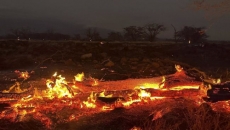Several major wildfires continue to burn out-of-control in British Columbia's Interior, where forecasted rain had been hoped to dampen blazes in parts of the Central Okanagan and the Shuswap.
But Environment Canada data shows neither Kelowna's airport nor Salmon Arm recorded measurable precipitation Tuesday, after initial predictions called for possible rain and thunderstorms in the evening.
The fire had been burning in a gully for the past couple of days, which was too dangerous to access. However, last night growth on the fire moved out of the gully to the north and, in one spot, crossed the northern guard.
— BC Wildfire Service (@BCGovFireInfo) August 30, 2023
The weather station at Kelowna International Airport did observe light rain Tuesday night at 6 p.m. and this morning at 5 a.m. but reported no precipitation otherwise.
The recent weather pattern did bring stronger winds, which forced Central Okanagan Emergency Operations yesterday to expand its evacuation alert for the McDougall Creek wildfire.
Residents of West Kelowna's Glenrosa and Westbank neighbourhoods have been asked to be ready to evacuate on short notice, along with owners of a number of properties at the Westbank First Nation north of Highway 97.
Environment Canada says winds in Kelowna have picked up, reaching 17 kilometres per hour Tuesday night and 15 kilometres per hour this morning, with gusts reaching 28 kilometres per hour at 4 a.m.
Meanwhile, the recent storms brought some rainfall to parts of the Fraser Canyon, with Lytton recording 1.6 millimetres of precipitation yesterday and light rain falling Tuesday night and this morning.
However, the nearby Kookipi Creek wildfire continues to burn, forcing the closure of Highway 1 just north of Boston Bar.
There are 418 active wildfires across the province as of this morning, with 188 classified as out of control. More than 30 have been sparked in the past 24 hours, mostly sparked by lightning in coastal regions.






